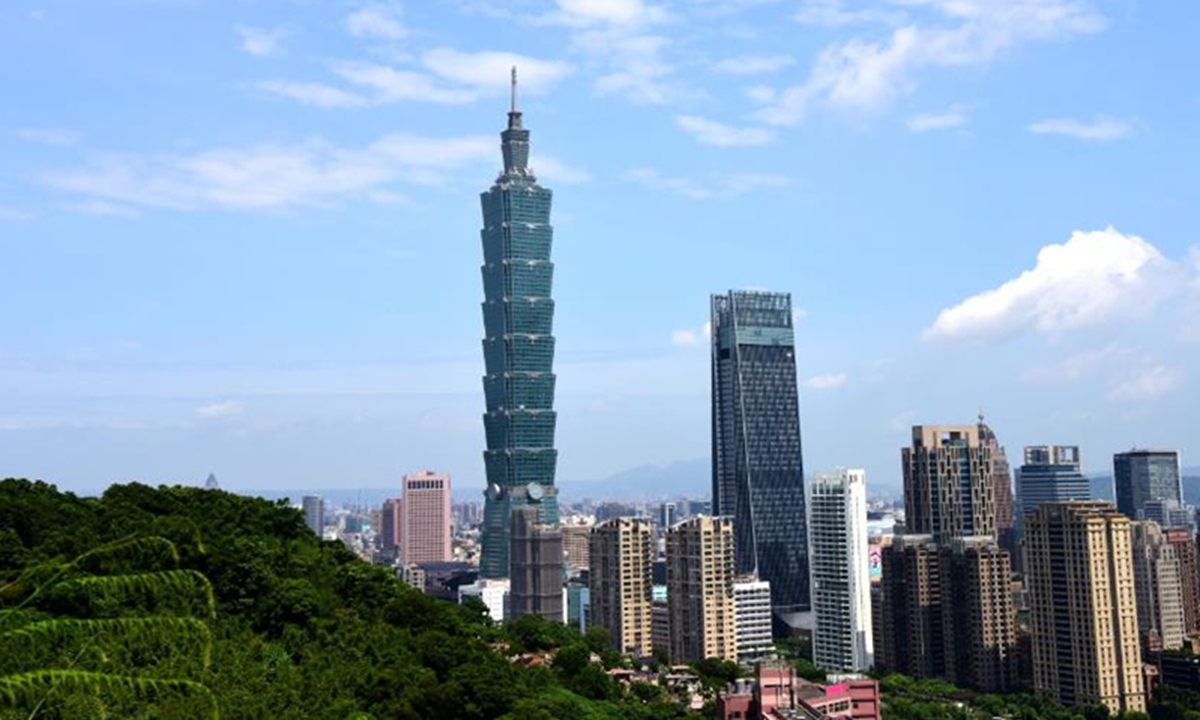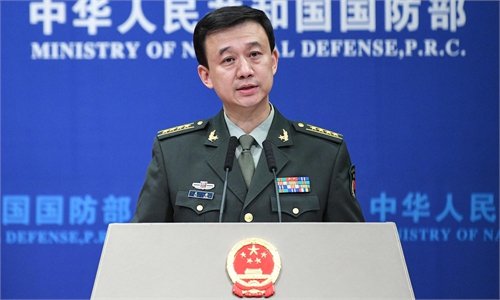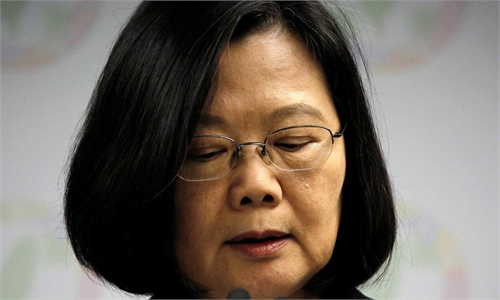US' Taiwan card extends to economy
Possible resumption of trade talks with US bait for DPP's meekness

The Taipei 101 skyscraper in Taipei, southeast China's Taiwan. Photo: Xinhua
With the use of the Taiwan card, the US' provocation of the Chinese mainland has extended to the field of trade and economy, just one day after three US senators' visit to the island.
Following Washington's recent announcement of a possible resumption of trade talks with the island stalled since the Obama administration, Chinese experts said on Tuesday that the US political bait to Taiwan will further undermine China-US relations and cross-Straits stability, while Taiwan needs to realize that relying on external forces cannot stop the trend of reunification.
When asked about the Biden administration's stance on a trade agreement with Taiwan at a House Foreign Affairs Committee hearing, US Secretary of State Anthony Blinken said the authority is engaged in conversations with the island of Taiwan on a framework agreement, "or soon will be," and "those conversations should be starting," Reuters reported.
Although there are no explicit signals on the pact, US media said Washington might resume Trade Investment Framework Talks (TIFA) with the island, which have not been held in 5 years.
Echoing Blinken's comments, Taiwan's Democratic Progressive Party (DPP) authority on Tuesday expressed its welcome to the US' lip service. The external affairs authority on the island said on Tuesday that they will make joint efforts with economic and trade authorities to push for the resumption of TIFA talks with the US, through "existing communication channels."
We urge the US to follow through on its commitment to the one-China principle and the Three China-US Joint Communiqués, stop carrying out any official exchanges with Taiwan island, and not send any wrong signals to Taiwan secessionists, Zhao Lijian, the spokesperson of the Chinese Foreign Ministry, said on Tuesday.
According to a Nikkei report, discussions are underway on including a reference to the Taiwan Straits in the joint statement to be issued after this month's G7 summit as the US and Japan seek a united front against the Chinese mainland.
Zhang Wensheng, a deputy dean of the Taiwan Research Institute at Xiamen University, told the Global Times on Tuesday that the US and the island are seeking to re-construct their relationship, in terms of politics, military and economy, amid tensions with the Chinese mainland.
Xin Qiang, deputy director of the Center for US Studies at Fudan University in Shanghai, told the Global Times on Tuesday that the US may resume contacts and negotiations with Taiwan. However, Washington will not be the active side.
Reuters said on Tuesday that there has been no indication of any willingness to pursue a full-scale trade pact Taipei has been seeking.
Some experts have singled out the political sensitiveness of TIFA, as it's far more than an economic and trade framework.
TIFA is a Free Trade Agreement (FTA), which exists only among countries, said Xin, noting that discussing TIFA can be viewed as challenging the one-China principle, which will be opposed by the mainland.
"The US will assess the consequences," Xin said.
Trade between Taiwan island and the US is much smaller than between the US and the Chinese mainland. In 2020, US-mainland trade was worth $586.7 billion, an increase of 8.3% from the previous year. Driven by exports of semiconductor equipment, Taiwan only managed to become the US' 10th largest trading partner in 2019, Taiwan media reported.
The US wants to use the possible trade talks resumption as bait, forcing the DPP authority to promote problematic pork imports and make concessions to give US goods better access to the Taiwan market, Xin said, noting that the US is not satisfied with the resistance of their ractopamine-enhanced pork to Taiwan.
An anti-problematic pork referendum will be held on August 28 in Taiwan, with over 62 percent opposed to it, according to a recent poll. US pork imports could be wiped out, media reported.
Although Taiwan has long wanted to improve its economic and trade ties with the US, the reality is that its economic dependence on the Chinese mainland is growing.
Data shows that Taiwan's exports to the mainland accounted for 43.9 percent of the total in 2020, media reported.
Although DPP authorities are seeking to have a deeper connection with the US in terms of economic-technology and industrial chain, the DPP's attempt to decouple its economy from the mainland is futile, as the mainland has a huge market and the two sides are geographically and culturally close. As the mainland's economy continues to develop, Taiwan's dependence on the mainland will deepen, Zhang said.




